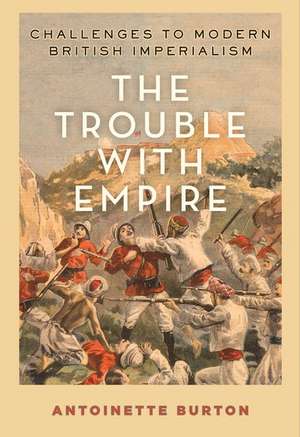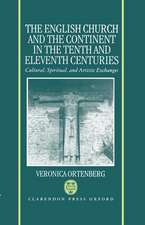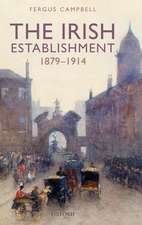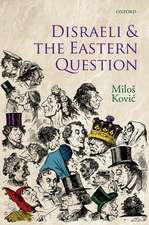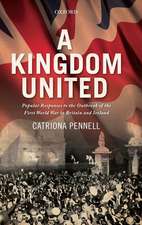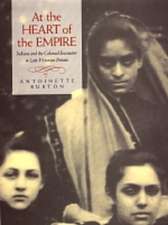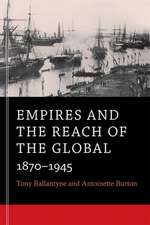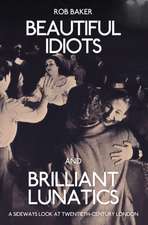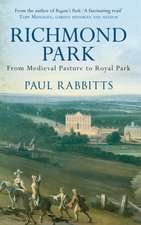The Trouble with Empire: Challenges to Modern British Imperialism
Autor Antoinette Burtonen Limba Engleză Paperback – 16 noi 2017
| Toate formatele și edițiile | Preț | Express |
|---|---|---|
| Paperback (1) | 197.77 lei 31-38 zile | |
| Oxford University Press – 16 noi 2017 | 197.77 lei 31-38 zile | |
| Hardback (1) | 230.80 lei 31-38 zile | |
| Oxford University Press – 13 noi 2015 | 230.80 lei 31-38 zile |
Preț: 197.77 lei
Preț vechi: 245.11 lei
-19% Nou
Puncte Express: 297
Preț estimativ în valută:
37.84€ • 40.47$ • 31.55£
37.84€ • 40.47$ • 31.55£
Carte tipărită la comandă
Livrare economică 07-14 aprilie
Preluare comenzi: 021 569.72.76
Specificații
ISBN-13: 9780190858551
ISBN-10: 0190858559
Pagini: 336
Dimensiuni: 203 x 130 x 23 mm
Greutate: 0.34 kg
Editura: Oxford University Press
Colecția OUP USA
Locul publicării:New York, United States
ISBN-10: 0190858559
Pagini: 336
Dimensiuni: 203 x 130 x 23 mm
Greutate: 0.34 kg
Editura: Oxford University Press
Colecția OUP USA
Locul publicării:New York, United States
Recenzii
It is rare to encounter a book that directly and effectively challenges the central paradigms of its field, and rarer still for one to do so successfully. In this book, Antoinette Burton ... takes up this task with her characteristic verve ... The implications of this argument are profound. Not only should the narrative history of the British Empire be reinterpreted as one of constant instability and challenge, but the fundamental precepts of so much imperial historiography must also be re-examined ... Burton has brought trouble, and those who caused it, to the centre of imperial history, and presented a powerful argument against any who would view the sunrise and sunset of Britain's empire without careful consideration of the long, fraught and turbulent day that lay between them.
Antoinette Burton has argued influentially for a new imperial history that draws insights from cultural, social, economic, political, and gender studies and merges domestic British history with that of the British Empire. The Trouble with Empire is a stirring call to advance that historiography by centering it on challenges to empire, rather than taking for granted British strength and the traditional narrative arc of imperial rise and fall... Written clearly and vigorously with admirable lack of jargon, The Trouble with Empire will be crucial for graduate courses on empire and extremely valuable for scholars working on empire, decolonization, and colonialism's legacies for the world today. Advanced undergraduate researchers will also find it helpful. It is simultaneously a satisfying read and a stimulating one, which will inspire scholars to continue along the paths Burton has marked out.
[A]n exciting read for historians who have engaged with histories of dissent, and it should be required reading for historians of the British Empire more generally....[I]deal for undergraduate students in particular. It is eloquently written and forcefully argued.
Antoinette Burton provides an entertaining overview of resistance.
The Trouble with Empire is an important corrective to a number of long-running assumptions within imperial historiography. Accessibly written and reasonably priced, it should become required reading for graduate and undergraduate students of European imperialism and of modern Britain. It will also appeal to anyone interested in the lasting impact of empire on our contemporary world.
At a time when voices increasingly suggest that the imperial turn is over, this fine essay by Antoinette Burton comes as a salutary reminder that even in the case of Britain, much work remains to be done before we have anything like a complete account of the imperial experience What Burton does so well is to demonstrate that such incidences, far from being sporadic and isolated, were part of the quotidian reality of colonial rule, and unless and until they are integrated fully into narratives of empire, our grasp of the imperial experience as a whole remains impoverished.
A brilliant work of synthesis ... [with] a convincing and provocative overarching argument The Trouble with Empire effectively demolishes the rise-and-fall narrative of imperial history, exposing its baseless foundational assumptions. It succeeds in bringing the rebellious actions of colonized populations to the fore in all of their diversity. While The Trouble with Empire will reinvigorate debates about imperial history and take those debates to a wider audience, it should also be troubling for imperial historians as they continue to confront the challenges facing the field.
Provocative and relevant ... Make[s] a plausible case that even at its apex, 'the empire on which the sun never set' contained the seeds of its own destruction.
The multiple tensions that characterized the empire are thoroughly familiar to historians who work in the local archives of empire. But they are only now beginning to be taken seriously by imperial historians. How to integrate them into a history of empire is a challenging and important task. Antoinette Burton has taken a first shot at how we may do this from an imperial history perspective, and for that we should be thankful.
[Burton] makes her complex and usefully provocative case easily accessible to a broad range of readers, as she challenges them to restore agency to colonial subjects, who are all too often in works of British imperial history largely invisible except as a passive collectivity [Burton] bolsters the construction of a multicultural British history -- and by extension society -- by giving colonial subjects a central role.
Bringing her signature independence of mind and sense of moral purpose to this work, Antoinette Burton challenges us to think of the British Empire less as a site of power than as a source of continuous struggle and instability. Provocative in purpose and sweeping in scope, The Trouble with Empire demands the attention of everyone interested in the history of empires.
Unmasking what she calls the 'methodological imperialism' that has taken empire as a given, Antoinette Burton manages to upend stubborn scholarly and commonplace perceptions that underlie much of imperial history. Her focus on the routine and everyday 'trouble' at the heart of empire exposes an inherently unstable, messy, and markedly less-assured enterprise. This brilliant, passionate, and iconoclastic book will change how we think about imperial history.
Burton brings together trends in feminist and subaltern histories in order to complicate the historiographical narratives of British imperialism. Burton aims to provide a counter-narrative to histories such as Niall Ferguson's Empire: How Britain Made the Modern World. In doing so, she is bridging the gap between these more populist histories and scholarly works. New students of imperialism at the undergraduate level will enjoy this book as an introduction to British imperialism, while her nuancing of the narratives will appeal to a wider audience who may be interested in histories of empire.
Antoinette Burton has argued influentially for a new imperial history that draws insights from cultural, social, economic, political, and gender studies and merges domestic British history with that of the British Empire. The Trouble with Empire is a stirring call to advance that historiography by centering it on challenges to empire, rather than taking for granted British strength and the traditional narrative arc of imperial rise and fall... Written clearly and vigorously with admirable lack of jargon, The Trouble with Empire will be crucial for graduate courses on empire and extremely valuable for scholars working on empire, decolonization, and colonialism's legacies for the world today. Advanced undergraduate researchers will also find it helpful. It is simultaneously a satisfying read and a stimulating one, which will inspire scholars to continue along the paths Burton has marked out.
[A]n exciting read for historians who have engaged with histories of dissent, and it should be required reading for historians of the British Empire more generally....[I]deal for undergraduate students in particular. It is eloquently written and forcefully argued.
Antoinette Burton provides an entertaining overview of resistance.
The Trouble with Empire is an important corrective to a number of long-running assumptions within imperial historiography. Accessibly written and reasonably priced, it should become required reading for graduate and undergraduate students of European imperialism and of modern Britain. It will also appeal to anyone interested in the lasting impact of empire on our contemporary world.
At a time when voices increasingly suggest that the imperial turn is over, this fine essay by Antoinette Burton comes as a salutary reminder that even in the case of Britain, much work remains to be done before we have anything like a complete account of the imperial experience What Burton does so well is to demonstrate that such incidences, far from being sporadic and isolated, were part of the quotidian reality of colonial rule, and unless and until they are integrated fully into narratives of empire, our grasp of the imperial experience as a whole remains impoverished.
A brilliant work of synthesis ... [with] a convincing and provocative overarching argument The Trouble with Empire effectively demolishes the rise-and-fall narrative of imperial history, exposing its baseless foundational assumptions. It succeeds in bringing the rebellious actions of colonized populations to the fore in all of their diversity. While The Trouble with Empire will reinvigorate debates about imperial history and take those debates to a wider audience, it should also be troubling for imperial historians as they continue to confront the challenges facing the field.
Provocative and relevant ... Make[s] a plausible case that even at its apex, 'the empire on which the sun never set' contained the seeds of its own destruction.
The multiple tensions that characterized the empire are thoroughly familiar to historians who work in the local archives of empire. But they are only now beginning to be taken seriously by imperial historians. How to integrate them into a history of empire is a challenging and important task. Antoinette Burton has taken a first shot at how we may do this from an imperial history perspective, and for that we should be thankful.
[Burton] makes her complex and usefully provocative case easily accessible to a broad range of readers, as she challenges them to restore agency to colonial subjects, who are all too often in works of British imperial history largely invisible except as a passive collectivity [Burton] bolsters the construction of a multicultural British history -- and by extension society -- by giving colonial subjects a central role.
Bringing her signature independence of mind and sense of moral purpose to this work, Antoinette Burton challenges us to think of the British Empire less as a site of power than as a source of continuous struggle and instability. Provocative in purpose and sweeping in scope, The Trouble with Empire demands the attention of everyone interested in the history of empires.
Unmasking what she calls the 'methodological imperialism' that has taken empire as a given, Antoinette Burton manages to upend stubborn scholarly and commonplace perceptions that underlie much of imperial history. Her focus on the routine and everyday 'trouble' at the heart of empire exposes an inherently unstable, messy, and markedly less-assured enterprise. This brilliant, passionate, and iconoclastic book will change how we think about imperial history.
Burton brings together trends in feminist and subaltern histories in order to complicate the historiographical narratives of British imperialism. Burton aims to provide a counter-narrative to histories such as Niall Ferguson's Empire: How Britain Made the Modern World. In doing so, she is bridging the gap between these more populist histories and scholarly works. New students of imperialism at the undergraduate level will enjoy this book as an introduction to British imperialism, while her nuancing of the narratives will appeal to a wider audience who may be interested in histories of empire.
Notă biografică
Antoinette Burton is Bastian Professor of Global and Transnational Studies and Professor of History at the University of Illinois at Urbana-Champaign. The recipient of a John Simon Guggenheim Foundation fellowship, she is the author of numerous works on the British empire, women and feminism, and world history, including At the Heart of the Empire: Indians and the Colonial Encounter in Late-Victorian Britain and Empire in Question: Reading, Writing and Teaching British Imperialism.
